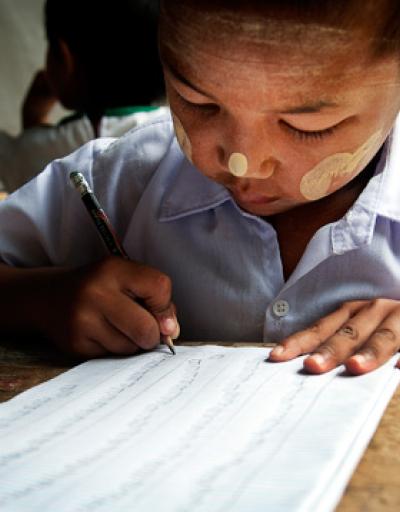
What you need to know about literacy
What is the global situation in relation to literacy?
Great progress has been made in literacy with most recent data (UNESCO Institute for Statistics) showing that more than 86 per cent of the world’s population know how to read and write compared to 68 per cent in 1979. Despite this, worldwide at least 763 million adults still cannot read and write, two thirds of them women, and 250 million children are failing to acquire basic literacy skills. Before the COVID-19 pandemic, which caused the worst disruption to education in a century, 617 million children and teenagers had not reached minimum reading levels.
How does UNESCO define literacy?
Acquiring literacy is not a one-off act. Beyond its conventional concept as a set of reading, writing and counting skills, literacy is now understood as a means of identification, understanding, interpretation, creation, and communication in an increasingly digital, text-mediated, information-rich and fast-changing world. Literacy is a continuum of learning and proficiency in reading, writing and using numbers throughout life and is part of a larger set of skills, which include digital skills, media literacy, education for sustainable development and global citizenship as well as job-specific skills. Literacy skills themselves are expanding and evolving as people engage more and more with information and learning through digital technology.
What are the effects of literacy?
Literacy empowers and liberates people. Beyond its importance as part of the right to education, literacy improves lives by expanding capabilities which in turn reduces poverty, increases participation in the labour market and has positive effects on health and sustainable development. Women empowered by literacy have a positive ripple effect on all aspects of development. They have greater life choices for themselves and an immediate impact on the health and education of their families, and in particular, the education of girl children.
How does UNESCO work to promote literacy?
UNESCO works through its global network, field offices and institutes and with its Member States and partners to advance literacy in the framework of lifelong learning, and address the literacy target 4.6 in SDG4 and the Education 2030 Framework for Action. Its Strategy for Youth and Adult Literacy (2020-2025) pays special attention to the member countries of the Global Alliance for Literacy which targets 20 countries with an adult literacy rate below 50 per cent and the E9 countries, of which 17 are in Africa. The focus is on promoting literacy in formal and non-formal settings with four priority areas: strengthening national strategies and policy development on literacy; addressing the needs of disadvantaged groups, particularly women and girls; using digital technologies to expand and improve learning outcomes; and monitoring progress and assessing literacy skills. UNESCO also promotes adult learning and education through its Institute for Lifelong Learning, including the implementation of the 2015 Recommendation on Adult Learning and Education and its monitoring through the Global Report on Adult Learning and Education.
What is digital literacy and why is it important?
UNESCO defines digital literacy as the ability to access, manage, understand, integrate, communicate, evaluate and create information safely and appropriately through digital technologies for employment, decent jobs and entrepreneurship. It includes skills such as computer literacy, ICT literacy, information literacy and media literacy which aim to empower people, and in particular youth, to adopt a critical mindset when engaging with information and digital technologies, and to build their resilience in the face of disinformation, hate speech and violent extremism.
How is UNESCO helping advance girls' and women's literacy?
UNESCO’s Global Partnership for Women and Girls Education, launched in 2011, emphasizes quality education for girls and women at the secondary level and in the area of literacy; its Literacy Initiative for Empowerment (LIFE) project (2005–15) targeted women; and UNESCO’s international literacy prizes regularly highlight the life-changing power of meeting women’s and girls’ needs for literacy in specific contexts. Literacy acquisition often brings with it positive change in relation to harmful traditional practices, forms of marginalization and deprivation. Girls’ and women’s literacy seen as lifelong learning is integral to achieving the aims of the 2030 Agenda for Sustainable Development.
How has youth and adult literacy been impacted in times of COVID-19?
Since the start of the pandemic, several surveys have been conducted but very little is still known about the effect on youth and adult literacy of massive disruptions to learning, growing inequalities and projected increases in school dropouts. To fill this gap UNESCO will conduct a global survey “Learning from the COVID-19 crisis to write the future: National policies and programmes for youth and adult literacy” collecting information from countries worldwide regarding the situation and policy and programme responses. Its results will help UNESCO, countries and other partners respond better to the recovery phase and advance progress towards achieving Sustainable Development Goal 4 on education and its target 4.6 on youth and adult literacy. In addition, for International Literacy Day 2020, UNESCO prepared a background paper on the impact of the crisis on youth and adult literacy.
What is the purpose of the Literacy Prize and Literacy Day?
Every year since 1967, UNESCO celebrates International Literacy Day and rewards outstanding and innovative programmes that promote literacy through the International Literacy Prizes. Every year on 8 September UNESCO comes together for the annual celebration with Field Offices, institutes, NGOs, teachers, learners and partners to remind the world of the importance of literacy as a matter of dignity and human rights. The event emphasizes the power of literacy and creates awareness to advance the global agenda towards a more literate and sustainable society.
The International Literacy Prizes reward excellence and innovation in the field of literacy and, so far, over 506 projects and programmes undertaken by governments, non-governmental organizations and individuals around the world have been recognized. Following an annual call for submissions, an International Jury of experts appointed by UNESCO's Director-General recommends potential prizewinning programmes. Candidates are submitted by Member States or by international non-governmental organizations in official partnership with UNESCO.

